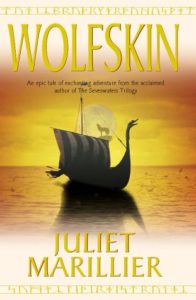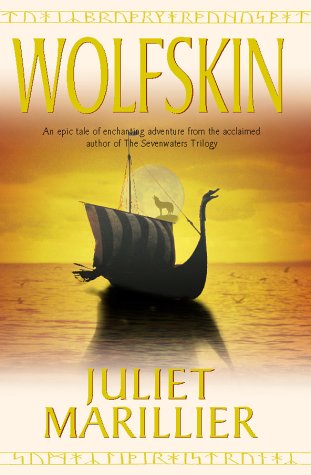Paganism and Christianity Hide In Juliet Marillier’s ‘Wolfskin’
 Juliet Marillier, author of fiction set centuries ago, in Europe, claims to be a pagan. She states that she belongs to a Druid order.1 Marillier has written several fantasy works, set in ancient Europe. She has won awards for her fantasy novels, according to the Wikipedia article on her.
Juliet Marillier, author of fiction set centuries ago, in Europe, claims to be a pagan. She states that she belongs to a Druid order.1 Marillier has written several fantasy works, set in ancient Europe. She has won awards for her fantasy novels, according to the Wikipedia article on her.
Recently I read her Wolfskin.2
The book presents two pagan religions as if they were real, and as if they gave real connection to a supernatural world. These two are a pagan religion found in the Orkney islands, where much of the book takes place, and a Norse religion. The pagan priestess, in an extreme situation, summons beings from the earth and the sea to help her. The Norse berserker warrior communes with his god in a vision.
The above wasn’t a great surprise, both from my previous recollection of her books, and because I knew that Marillier claimed to be a pagan herself. However, one of the characters is a Christian priest, Tadhg, who is presented as if Christianity were also real. Marillier says: “A discussion of religion and spirituality creeps into every book I write, because it’s important to me. It was especially interesting in Wolfskin, because here we have three different sets of beliefs in potential opposition to one another.” Her sympathetic portrait of a Christian was a surprise.
Here’s an important passage:
“. . . Doesn’t your god love even sinners?”
Tadhg regarded her gravely. “Indeed. God is in all of us. Some are clothed in the brightness of the Holy Spirit, and goodness shines from them, a goodness which has its source deep within. Such a sweet wellspring never runs dry. No force or evil can pollute its clear water. But some are weaker vessels, and that small spark of the divine is hidden far within them. It takes a brave man or woman, Nessa, to open up his very being and examine what is there: to lay his soul bare to that burning light. Such a choice is fearful indeed, for one must recognize the fear and anguish, the deceit and duplicity, the lust and the violence, all the wretchedness that mortal man bears in his essential clay. Yet, if a man dare open himself to God’s love, his sins are forgiven and the path made new. That is the wondrous truth of which our Lord Jesus told. It is the way of light. . . .”3
C. S. Lewis said, in several of his writings, that paganism wasn’t entirely wrong. (He did not propose that paganism was meant to be the way to God — Christianity is that way.) Perhaps Marillier is a modern-day example, showing that paganism isn’t entirely wrong. Lewis, of course, had Merlin, a druid, as a major character in his That Hideous Strength.
Here’s what David C. Downing had to say about this matter:
. . . Lewis rejected both universalism and predestination as negations of free will. His position is better described as “inclusivism,” the idea that Christ’s reconciling work may sometimes apply even to those who are not aware of it. Lewis did not feel that he was being unorthodox in this matter. He refers several times in his letters to Christ’s portrayal of judgement in which he welcomes those who fed the hungry, clothed the naked, and visited the sick, saying that all such service done for the least of his brethren is accounted as service done to him.4
Downing further observes:
In The Discarded Image . . . [Lewis] spends two pages showing that pagans and early Christians had far more in common than either shares with modern thinkers. Pagan is one of those words . . . that has a specialized meaning in Lewis’s books. In common usage, pagan and Christian are practically contraries, the first representing a secular, this-worldly attitude, and the second representing its opposite. Lewis saw no such antithesis; he called paganism “the childhood of religion . . . a prophetic dream” For him, paganism was an anticipation, Christianity the fulfillment.5
And here’s a quotation from Lewis, himself:
“. . . Has it ever struck you what an odd creation Merlin is? He’s not evil; yet he’s a magician. He is obviously a druid; yet he knows all about the Grail. . . .”6
In the end of the book, Merlin is used by God, or at least by God’s representatives, the spirits of the planets.
Marillier’s work shows that a modern-day druid can acknowledge and set forth God’s remedy for human sin, even though she does not seem to have accepted that remedy for herself.
- Author2Author: Juliet Marillier & Jules Watson, Bonus Question, Ron Hogan, Beatrice.com, May 29, 2005. ↩
- Review originally posted at SunandShield.Blogspot.com. ↩
- Wolfskin (New York: Tom Doherty Associates, 2002) p. 149. ↩
- Into the Wardrobe: C. S. Lewis and the Narnia Chronicles. San Francisco: Jossey-Bass, an imprint of John Wiley & Sons, 2005, pp. 84–85. ↩
- Ibid, p. 109. ↩
- Dr. Dimble, speaking to Jane Studdock, in That Hideous Strength, by C. S. Lewis. New York: Collier, 1962, p. 31. ↩





































You act surprised, but pagans actually have fewer problems acknowledging other religions because they’re (usually some form of) polytheistic (or pantheistic) rather than “no gods before me” monotheistic. They’re not as defensive. In my experience on teh interwebs, people who identify as pagans or Wiccans are actually some of the least toolish about religious topics.
True enough. I remember being surprised to discover that my Hindu friend knew the song ‘Shine, Jesus, shine’ because they enjoyed singing it in her family! But of course for polytheists there’s no contradiction there (although I do wonder what they made of some of the words)
Wasn’t that why Christianity started getting into hot water right from the beginning – because of the exclusivity aspect? It was OK to have your god – but not to say he was the only one and the others weren’t.
The description of Christianity does seem rather odd, though.
A similar situation–or at least, potentially unsettling to some–occurs in the Dresiden Files. Harry is a wizard–and not of the Harry Potter Ridonkculous variety, but pentacles and spirits of knowledge, werewolves, etc. But one of Harry’s best friends is a strong Catholic, and they often fight the forces of evil together. Neither condemns the other, and the two are equally strong fighters.
Merlin in That Hideous Strength is sort of an odd character. Lewis holds forth that at the time, his magic was a natural or neutral thing. When he offers his power to Ransom to fight the NICE, he is told that it is utterly unlawful now, and even then it wasn’t quite so.
His “help”…well, it always surprises me that not many people criticize Lewis for writing that book. Essentially because Merlin is “good, but not too good,” he can become a conduit for all seven or so of the planetary Oyarsa and bewitch all the people at the NICE compound until their judgement comes. That costs his life, and they use him up in the process. His soul is saved, and he himself seems to have had less importance on life than a modern does. For example, he thought Jane should have her head struck off for using birth control and failing to beget a child who would rule England. Still, it is a weird ending to his cosmic series, and muddles the waters about paganism in his fictional universe.